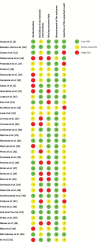Respiratory muscle training in neuromuscular disease: a systematic review and meta-analysis
- PMID: 36450369
- PMCID: PMC9724913
- DOI: 10.1183/16000617.0065-2022
Respiratory muscle training in neuromuscular disease: a systematic review and meta-analysis
Abstract
Background: Neuromuscular disease causes a progressive decline in ventilatory function which respiratory muscle training may address. Previous systematic reviews have focussed on single diseases, whereas this study systematically reviewed the collective evidence for respiratory muscle training in children and adults with any neuromuscular disease.
Methods: Seven databases were searched for randomised controlled trials. Three reviewers independently reviewed eligibility, extracted characteristics, results, determined risk of bias and combined results using narrative synthesis and meta-analysis.
Results: 37 studies (40 publications from 1986-2021, n=951 participants) were included. Respiratory muscle training improved forced vital capacity (standardised mean difference (SMD) 0.40 (95% confidence interval 0.12-0.69)), maximal inspiratory (SMD 0.53 (0.21-0.85)) and maximal expiratory pressure (SMD 0.70 (0.35-1.04)) compared to control (usual care, sham or alternative treatment). No impact on cough, dyspnoea, voice, physical capacity or quality of life was detected. There was high degree of variability between studies.
Discussion: Study heterogeneity (children and adults, different diseases, interventions, dosage and comparators) suggests that the results should be interpreted with caution. Including all neuromuscular diseases increased the evidence pool and tested the intervention overall.
Conclusions: Respiratory muscle training improves lung volumes and respiratory muscle strength in neuromuscular disease, but confidence is tempered by limitations in the underlying research.
Copyright ©The authors 2022.
Conflict of interest statement
Conflict of interest: D.J. Berlowitz has disclosed the following relationships outside the submitted work: board director for the Institute for Breathing and Sleep. The remaining authors have nothing to disclose.
Figures



References
-
- Anderson C, Evans C. Does inspiratory muscle training improve lung function, inspiratory muscle strength or inspiratory muscle endurance in people with Duchenne muscular dystrophy? Cardiopulm Phys Ther J 2013; 24: 2. doi:10.1097/01823246-201324040-00022 - DOI
Publication types
MeSH terms
LinkOut - more resources
Full Text Sources
Medical
